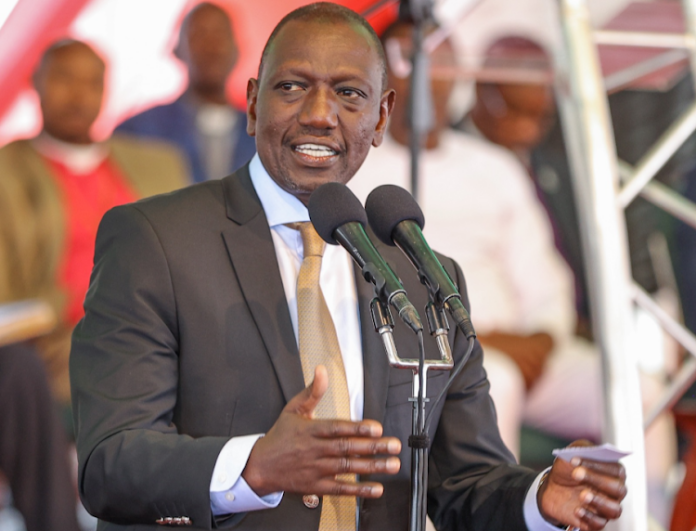Next week, a 2.75% decrease from gross pay will be presented.
Teachers, civil employees, and other salaried Kenyans would see a 2.75 percent reduction from their gross income go toward a new health insurance fund.
President William Ruto intends to make it mandatory for all Kenyan households to contribute 2.75 percent of their income to a new social healthcare fund.
A new bill, the Social Health Insurance Bill 2023, will also make it essential for all Kenyans to be members of a new Social Health Insurance scheme, which will replace the current National Health Insurance Fund (NHIF), in order to receive government services.
The State intends to boost deductions from the present range of Sh150 to Sh1,700 to a fixed charge calculated at 2.75 percent of total monthly wages in order to support the big health scheme.
The impending deductions will further reduce Kenyan workers’ take-home pay, which has already been reduced by the housing tax and increasing contributions to the National Social Security Fund (NSSF).
The state will take around Sh10,264 or 20.5 percent of those earning Sh50,000 gross income through income As You Earn (PAYE), NSSF, housing levy, and health care contribution, up from the current Sh8,460.
Workers earning Sh100,000 will lose Sh27,389 (or 27.4 percent), with the agony increasing for those earning more.
The new deduction is scheduled to begin on October 1, 2023, with a slew of additional levies established in the Finance Act 2023 already in place.
Some taxes were scheduled to begin in July, some on September 1st, and the final on January 1st, 2024, according to the Finance Act 2023.
The deductions underline the toll that workers must bear in order to pay President Ruto’s universal health care (UHC), cheap housing, and expanded pension schemes, among other fiscal priorities.
UHC will be modeled on three independent funds under the State-backed Social Health Insurance Bill, 2023—one for preventive and primary health care, another for primary referrals, and a third for chronic illness treatment.
“These funds are to be managed by a single board and secretariat, based on the proposed 2.75 percent deductions on household income from both the formal and informal sectors,” said State House spokesperson Hussein Mohammed.
Mr. Mohammed stated that the funds are part of the President’s plan to fulfill the UHC guarantee.
The manifesto of the ruling Kenya Kwanza coalition committed to employ and commence compensation for community health advocates, as well as to integrate preventative and promotional services.
According to Mr. Mohammed, the Primary Health Care Bill 2023 creates a framework for the delivery, access, and management of primary health care.
The Bill calls for the reorganization of primary health care service delivery, including dispensaries and health clinics.
“It establishes the framework for the 100,000 community health promoters who will be commissioned by the President in October 2023 and outlines the services they will offer when they visit households,” he explained.
“This means that Kenyans seeking services at these levels can walk in and walk out without incurring any bill.”
To make the goal a reality, the government will draft legislation that will make membership in the new health care system mandatory in order to entice the 80 percent of Kenyans who work in the informal sector to contribute to the program.
Those who cannot provide proof of current contributions will be refused State services under new laws that would put social health care membership on par with Kenya Revenue Authority (KRA) personal identification numbers (PINs).
Non-contributors to the health care scheme will be prevented from performing crucial transactions like as land title registration, development plan approval, motor vehicle transfer and licensing, and access to the Hustler Fund.
The state sees increased payments as a method to save the UHC, but it will have to overcome the issue of dormant membership, which has harmed the NHIF in the past.
The state health insurance earned Sh78.84 billion in premiums in the fiscal year ending June 2022, compared to the anticipated Sh90.57 billion, and has failed to pay hospitals for services rendered.
In May of this year, hospitals began turning away patients seeking treatment under the NHIF cover due to unpaid claims totaling at least Sh12 billion, revealing the scheme’s poor financial position.
Higher health-care contributions, along with the new housing levy, a new PAYE band of 35%, and NSSF, will see Kenyans earning more than Sh200,000 per month pay at least 30.8 percent of their incomes to the state, up from the current 27 percent.
A Sh200,000 payslip will be deducted Sh61,639 (an increase of Sh7,680) from the current Sh53,959, while workers earning Sh500,000 will face deductions of Sh164,389 (33 percent), up from Sh143,959.
A Sh800,000 earner will contribute Sh276,106 or 34.5 percent, or an additional Sh42,147 to the state.
Kimani Ichung’wah, Majority Leader of the National Assembly, is likely to introduce the bill before Parliament for debate and passage into law.
Other bills include the Primary Healthcare Bill for 2023, the Digital Health Bill for 2023, and the Facility Improvement Financing Bill for 2023.




![Kenya’s Top 10 Marketable Degree Programs [List] Kenya's Top 10 Marketable Degree Programs [List]](https://opportunitiesforkenyans.co.ke/wp-content/uploads/2025/02/Kenyas-Top-10-Marketable-Degree-Programs-List-100x70.jpg)

